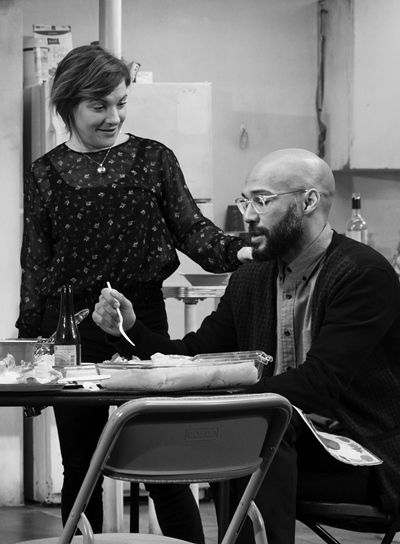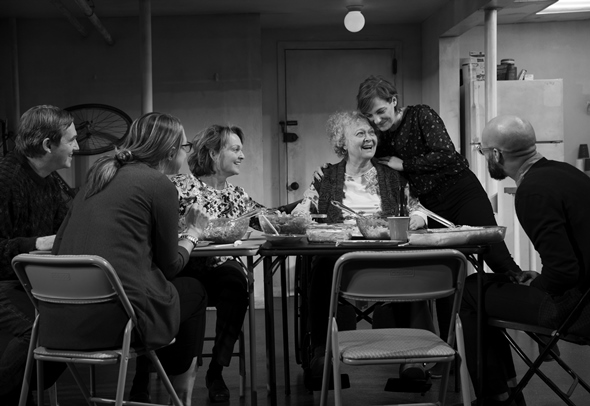Of mortal frailty and monstrous transgression: Broadway in Chicago spotlights ‘The Humans’
Review: “The Humans” by Stephen Karam, national tour directed by Joe Mantello at the Cadillac Palace Theatre through Feb. 11. ★★★★
By Lawrence B. Johnson
In the midst of Stephen Karam’s abrasive family drama “The Humans,” the question of monsters comes up. Monsters in dreams. And someone speculates that if humans dream of monsters, perhaps what strikes terror in the imagination of horrid fantastical creatures is the image of a human.
It’s a fleeting exchange, but it lies right at the core of this group portrait of people grappling with dreadful reality, hideous betrayal, terrifying truths about themselves. These are quite ordinary humans, with dark centers where it is not safe to go. They are us.
 And what more conducive circumstance for a penetrating family snapshot, a sort of print negative, than Thanksgiving dinner?
And what more conducive circumstance for a penetrating family snapshot, a sort of print negative, than Thanksgiving dinner?
“The Humans,” which had its world premiere at Chicago’s American Theater Company three seasons ago, has garnered a slew of high-profile awards, including the 2016 Tony for Best Play. It is made of potent stuff.
Erik and Dierdre Blake, their grown daughter Brigid and Erik’s mentally failing mother have all descended on the modest apartment of a younger daughter, Aimee, and her boyfriend Richard. Almost everyone tries to smile – the patriarch Erik maybe not so much. But almost no one is happy; except maybe the boyfriend, who does not yet hold full membership in the family.
It’s not that they don’t all love each other. They do. But lots of things aren’t right. And it doesn’t help that Aimee’s dad and mom get an early start on belittling the young couple’s meager two-level apartment – one level above ground, one below and upstairs neighbors who make a constant thumping racket.
Set designer David Zinn’s boxy apartment, with one window above – where you have to stand to make your cell phone work — and none below, offers a claustrophobic metaphor for a family that finds the walls closing in from every side.
 From the moment he walks into his daughter’s make-do abode, Erik (Richard Thomas – yes, John-Boy from the “Waltons” back in the day) is needling Aimee about the shortcomings of her home and, by extension, her life. And who is this guy she’s living with, what’s he doing with his life and why aren’t they married?
From the moment he walks into his daughter’s make-do abode, Erik (Richard Thomas – yes, John-Boy from the “Waltons” back in the day) is needling Aimee about the shortcomings of her home and, by extension, her life. And who is this guy she’s living with, what’s he doing with his life and why aren’t they married?
Dierdre (the acerbic, long-suffering Pamela Reed) may be more selective in her disapproval, but she’s just as severe. Then again, Aimee (Therese Plaehn, at once determinedly buoyant and just this side of despair) gives as good as she gets: She’s drowning in college debt, accumulated in the absence of any help from her parents.
Sister Brigid (tall, sober, terrified Daisy Eagan) is present more in body than spirit. A lesbian, she has recently been dumped by her partner. She’s also coping with a severe illness that has cost her any hope of rising through the ranks at the law firm where she works. In fact, her days at the firm are numbered – just as she’s looking at expensive surgery and its aftermath.
 Poor Richard. The straw man, Aimee’s beau (Luis Vega, who looks on with amazed passivity). He’s approaching 40, when he will come into a significant trust. He and Aimee will be doing fine. Anyway, that’s how it looked when the curtain rose. Could be the curtain’s coming down on Aimee and Richard. Dad has some news.
Poor Richard. The straw man, Aimee’s beau (Luis Vega, who looks on with amazed passivity). He’s approaching 40, when he will come into a significant trust. He and Aimee will be doing fine. Anyway, that’s how it looked when the curtain rose. Could be the curtain’s coming down on Aimee and Richard. Dad has some news.
I’ll let Dad share those tidings. Let’s just say the parents are experiencing an adjustment in their lifestyle. It’s pretty awful – appalling, actually. But this sort of thing happens, and they’re OK now. Still, they’ve had to tighten their belts. And it’s going to be harder to take care of Erik’s mother – “Momo,” as the girls have always called their grandma.
Lauren Klein’s guttural performance as Momo rises in its rage to an articulate expression of the monstrous grief that has beset their household. In sputtering, spitting wordlessness, this demented old woman storms against the ugliness, the abject spiritual failing she perceives around her. Her son did this.
Erik, indeed, has confessed – to his flock, his family, his everything. Thomas plays out the man’s mortification in tremendous solitude, in gripping, surging agony: Erik, alone, in darkness, a muttering wretch desperate for one luminous ray of hope. And it comes, with infinite gentleness. On the voice of a child – his child, who draws him from the place of monsters.
Related Link:
- Performance location, dates and times: Details at TheatreinChicago.com
Tags: Broadway in Chicago, Daisy Eagan, David Zinn, Joe Mantello, Lauren Klein, Luis Vega, Pamela Reed, Richard Thomas, Stephen Karam, The Humans, Therese Plaehn


